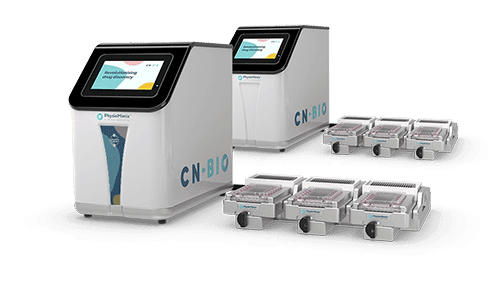London, UK, 23 May 2018: CN Bio Innovations Limited today launched PhysioMimix, a printer-sized device which allows scientist to conduct organ-on-chip studies in their own labs, testing new drugs and chemicals on living human organ models.
Dr Emma Sceats, CEO of CN Bio Innovations, said: “We can all understand the value of predicting how a new drug, food additive, cosmetic or chemical will affect the key organs in our bodies.
“In particular, researchers working hard on new treatments for diseases such as cancer and Alzheimer’s can gain vital knowledge from precise lab-based studies using human cells and tissues.
“We’ve designed PhysioMimix to provide a compact, efficient way for scientists to bring this new level of scientific capability – human organ emulation systems – in-house.”
The PhysioMimix system is powered by technology licensed from the Massachusetts Institute of Technology, developed in the laboratory of Professor Linda Griffith. In March 2018, Nature Scientific Reports published results from the development by Griffith and collaborators at CN Bio Innovations and engineering design consultancy Continuum of a 10-organ “Human-Body-on-a-Chip”: the final milestone of a five year $26M contract with the Defense Advanced Research Projects Agency (DARPA).
PhysioMimix’s open-well plates enable the formation of micro-tissues that mimic the structure and function of human organs and tissues. Linking two or more of these miniature systems using microfluidics can reveal how multiple organs interact and respond to stimuli. PhysioMimix can be quickly and easily installed in cell culture labs. It is compatible with most standard equipment and incubators, and can be used flexibly to perform single-organ or multi-organ experiments to support a range of research needs.
The open well system makes it easy for researchers to introduce primary cells, stem cells or pre-formed tissues to create the organ mimics and remove samples for analysis throughout an experiment. PhysioMimix MPS plates support the study of many organ mimics including include liver, lung gut, heart, kidney, skin, endometrium and brain.
CN Bio CTO Dr David Hughes said: “The data from PhysioMimix means scientists can zero in on drug targets, toxicity mechanisms and drug-drug interactions, moving drugs into clinical trials and avoiding costly failures.
“PhysioMimix can provide invaluable data, particularly for innovative human specific modalities such as antibody or gene therapies.”
CN Bio’s Organ-on-Chip platform is already being used by the Food and Drug Administration (FDA), the United States’ regulatory body, and in leading pharmaceutical and biotech labs. At FDA, scientists are evaluating the use of the PhysioMimix system to provide precise data about how human organs interact with new drugs, to accurately predict the success of drugs prior to human clinical trials.
MIT’s Prof Linda Griffith said: “It’s very important to have new “Organ-on-Chip” technologies that represent human physiology, to model human diseases and predict how drugs work in humans in ways that are simply not possible with animal models. We designed this technology to provide a robust, user-friendly platform for application in all phases of drug development – from discovery to pre-clinical testing, and we’re delighted to see it available to other researchers with the launch of CN Bio’s PhysioMimix system.”
Dr Shilpa Chokshi, Chief Scientific Officer, Foundation for Liver Research, London said: “PhysioMimix will allow us to gain a whole range of data and insights beyond what we get using current techniques.”
“The problem for us and many researchers like us is that models such as static tissue culture simply don’t accurately recapitulate disease. There is an urgent unmet need for relevant models of disease. Organ-on-chip studies will allow us to understand the pathophysiology of liver disease – including liver injury, non-alcoholic fatty liver disease and liver cancer, and to look at the utility of new drugs, including their efficacy and toxicity.”
Further information about Organ-on-Chip microphysiological systems
CN Bio’s PhysioMimix® is a microphysiological systems platform – commonly referred to as an Organ-on-Chip platform. PhysioMimix® enables fast and easy creation of three dimensional tissue-mimetics and automatically controls microfluidics, for long-term cell cultures. The open well format allows researchers to easily seed and dose cells. Cells and media can be sampled throughout experiments for analysis including biomarker assays, imaging to visualize cell morphology, cell migration and protein marker localization. By adding human cells to these systems, researchers aim to model human-specific properties of organ function and better predict clinical effects of drugs in vitro.
About CN Bio Innovations
CN Bio Innovations develops devices that boost the precision and speed of biological research. By predicting the effects chemical and biological substances will have on human organs, researchers can fast-track improvements in healthcare. In the past 4 years CN Bio has worked on more than 25 projects with pharmaceutical partners, using our Organs-on-Chips and related microfluidic devices to gather precise, human-relevant data.
CN Bio was a co-recipient with the Massachusetts Institute of Technology in 2012 of a $26M US government contract (DARPA) to develop a “body-on-a-chip”. In March 2018, Nature Scientific Reports published details of the successful final milestone of this program: completion of a platform connecting engineered tissues from 10 organs. This technology allows researchers to accurately replicate human organ interactions for weeks at a time and to measure the systemic effects of drugs on the body. Spun out from the University of Oxford, the company is collaborating with and developing intellectual property from several leading UK and US universities.
For more information visit www.physiomimix.com

